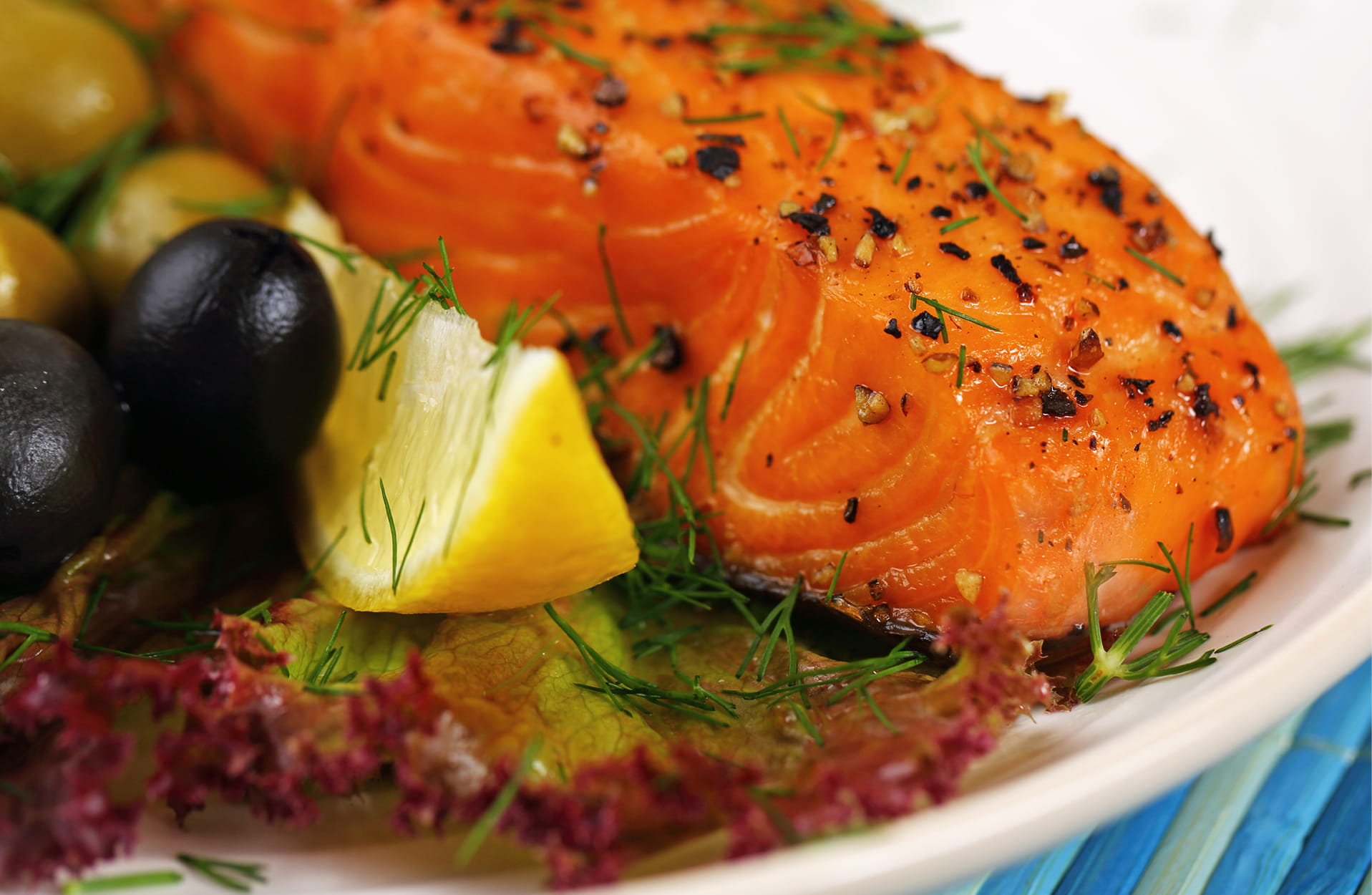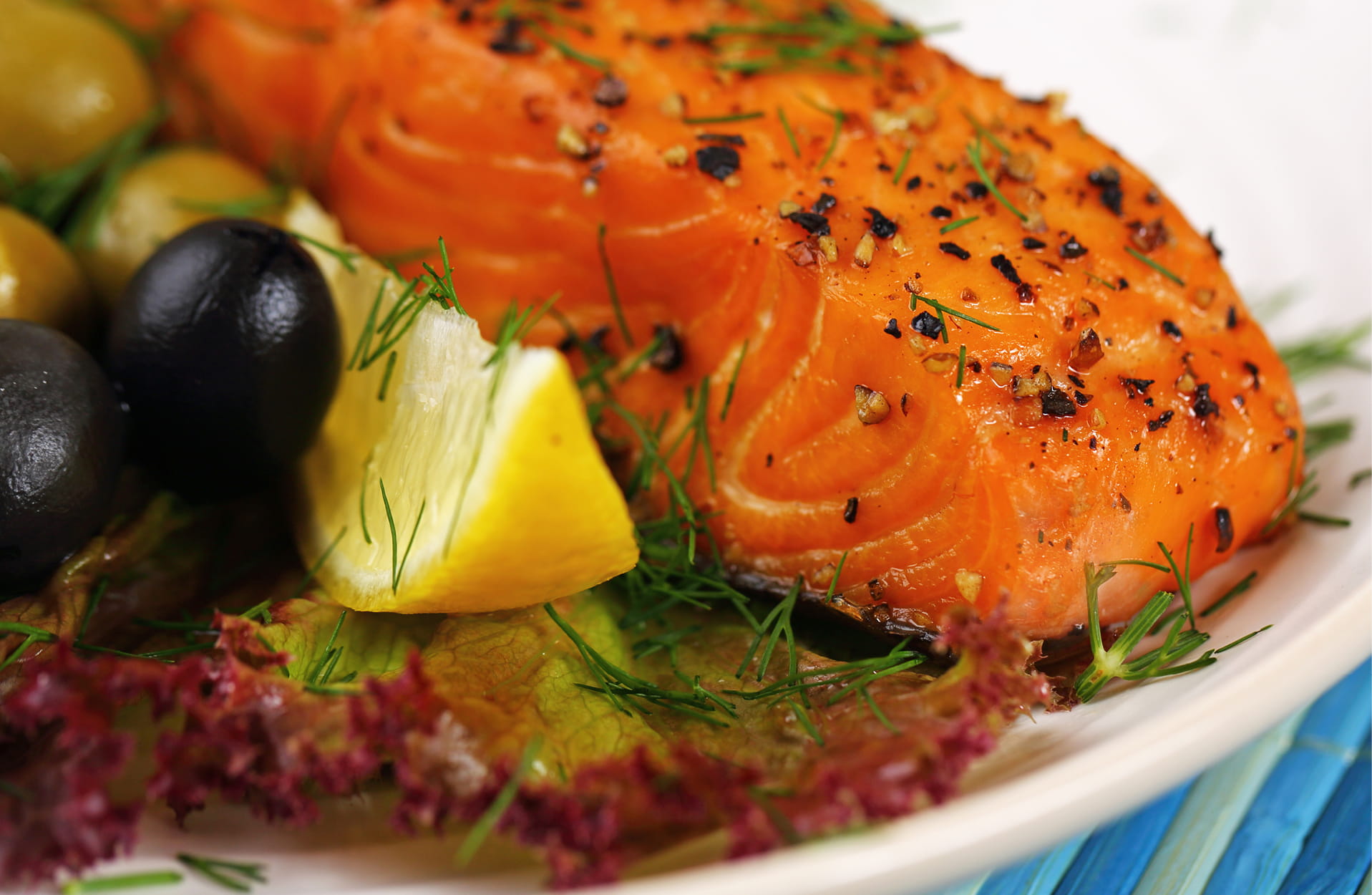5 health benefits of the Mediterranean diet
This delicious diet can reduce your risk of chronic disease, while helping you live longer.
When you think of the Mediterranean diet, do the flavors of Italian and Greek cuisine come to mind? While the true Mediterranean diet is based on the coastal region’s traditional fruits, vegetables, seafood, beans, nuts and olive oil — perhaps with a glass of red wine thrown in — this healthy dietary plan centers around a style of eating, rather than a specific cuisine.
“The Mediterranean diet is a pattern of eating that encompasses nine food groups to promote healthy outcomes,” says Amy Pinkham, RDN, a registered dietitian at Geisinger. “It’s not about a regimented diet plan or calorie-constricted diet. Instead, you choose the ingredients in these food groups and you can eat any cuisine you desire, so it’s much more sustainable.”
What is the Mediterranean diet?
The Mediterranean diet emphasizes a variety of nutrient-dense ingredients that come from fruits, vegetables and whole grains, paired with lean proteins. Followers limit processed foods that are high in sugar, refined carbohydrates and unhealthy fats (think chips, cookies, cake, white bread and white rice).
The nine food groups of the Mediterranean diet are:
- Vegetables. Aim for two to three cups daily.
- Legumes, such as peanuts, lentils, peas and soybeans. Two cups a week are recommended.
- Fruits and nuts. Aim for up to two cups of fruit and one-quarter cup of nuts daily.
- Whole grains, such as whole grain bread, pasta and cereal. About one-and-a-half cups daily are recommended.
- Fish and seafood, eaten two to three times a week.
- Healthy oils and fats, primarily olive oil. Replace animal fats with plant-based fats.
- Low-fat dairy. Cut back on high-fat dairy, such as whole milk, butter and cheese, and limit it to less than one cup per day.
- Lean meats. Limit high-fat meat and keep portion size around three to four ounces.
- Alcohol. Limit alcohol to two glasses or less for men and one glass or less for women per day.
Benefits of the Mediterranean diet
Deliciousness aside, research consistently shows the Mediterranean style of eating offers a vast array of health benefits that can reduce your risk of chronic disease, while prolonging your life.
“One of the beauties of this way of eating is it works for everybody,” says Pinkham. “If there’s someone in your household with diabetes and another with heart disease, you might not have to make two separate meals. This diet includes a variety of nutrients and, for the most part, works for the whole family to maintain health.”
Reduced risk of heart disease and stroke
Several studies point to people, especially women, who follow the Mediterranean diet closely are associated with a lower risk of heart disease and stroke.
The Mediterranean diet limits saturated fats (butter and high-fat meats) and trans fats (prepackaged foods, margarines and fried fast foods), while encouraging more heart-healthy fats found in salmon, avocado, olive oil, nuts and seeds.
Healthy fats are rich in omega-3 fatty acids that can reduce inflammation and triglycerides that increase cholesterol. In contrast, a diet high in saturated and trans fats increases cholesterol, which causes plaque buildup in your arteries, and puts you at a higher risk for heart attack and stroke.
What’s more, the diet prioritizes herbs and spices over sodium, which can raise your blood pressure and increase your risk for heart attack or stroke.
Decreased risk of Type 2 diabetes
Recent research shows the Mediterranean diet lowers the risk of developing Type 2 diabetes. The diet plan encourages healthy fats, which aid in regulating blood sugar levels, while limiting refined carbohydrates, including sugar, which can cause your blood sugar to spike.
Plus, fruits, veggies and whole grains are rich in fiber, which digest slowly and prevent huge swings in blood sugar. Fiber helps you feel full longer. And when you take in fewer calories, you can maintain a healthier weight.
Protects against certain cancers
The Mediterranean diet has been shown to reduce the risk of certain cancers, including breast, colorectal, bladder, and head and neck cancers. The eating pattern encourages foods high in fiber and antioxidants, which help control inflammation, regulate hormones and promote cellular health to protect against some cancers.
Wards off cognitive decline
The Mediterranean diet has been linked to lower dementia risks. Healthy fats, typically found in plant-based foods and seafood, promote brain health and reduce inflammation, which can help protect against cognitive decline.
Increases lifespan
According to a study in The New England Journal of Medicine, followers who incorporated at least seven of the diet’s nine food groups into their daily diet reduced their risk for dying by any cause by 25%.
How to eat the Mediterranean diet in everyday meals
The Mediterranean diet has become a popular way of eating because the foods are flavorful, it’s easy to follow and it’s budget-friendly. While adjusting your eating habits may be tough, the diet plan’s health benefits that could prolong your life may just be the motivation you need.
“The great thing about the Mediterranean diet is you’re not confined to a specific meal plan,” says Pinkham. “You can take any recipe you know and love from your favorite cookbooks or family traditions and easily convert them to be more in line with the Mediterranean diet to eat healthier for life.”
She points to a specific example: Tacos. The popular American staple at many family dinner tables entails a flour tortilla, ground beef, lettuce and tomatoes, cheese and sour cream.
To make a healthier, Mediterranean version, Amy suggests the following:
- Swap the flour tortilla for a corn shell or corn tortilla to get a whole grain.
- Exchange high-fat beef for lean ground beef, scaling back the portion size and adding beans.
- Add more fruits and veggies, such as onions, bell peppers (which are fruits!), salsa and avocado.
- Use natural cheese instead of a highly processed one, such as cheddar.
- Replace sour cream with Greek yogurt.
- Add flavor with herbs, spices and citrus zest, instead of relying on oil and salt.
It’s still a yummy taco, and may even have enhanced flavor. But it’s a healthier option than the typical American version.
Hands-on healthy cooking classes
Still have questions about converting your favorite recipes? Pinkham, a certified culinary medicine specialist, teaches these skills and other tips to incorporating the Mediterranean diet in Geisinger’s culinary medicine cooking classes. These hands-on classes, available in-person or virtually, combine the art and skill of cooking with the science of nutrition. They are free and open to the community — no culinary skills required.
“We teach participants how to make small and sustainable lifestyle changes to support their health,” she explains. “You’ll first learn the role of food in treating and preventing disease, and the principles of the Mediterranean diet. Then you’ll gain valuable cooking skills, while making new, delicious recipes so you can eat healthier for the rest of your life.”
Next steps:
Sign up for culinary medicine cooking classes
Find a dietitian at Geisinger
Could what you eat reduce inflammation?





